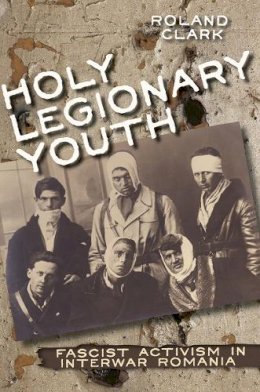
Stock image for illustration purposes only - book cover, edition or condition may vary.
Holy Legionary Youth: Fascist Activism in Interwar Romania
Roland Clark
FREE Delivery in Ireland
Description for Holy Legionary Youth: Fascist Activism in Interwar Romania
Hardback. Num Pages: 288 pages, 9 black & white halftones, 2 tables. BIC Classification: 1DVWR; 3JJG; HBJD; HBLW; JPFQ. Category: (G) General (US: Trade). Dimension: 229 x 152 x 23. Weight in Grams: 542.
Founded in 1927, Romania's Legion of the Archangel Michael was one of Europe's largest and longest-lived fascist social movements. In Holy Legionary Youth, Roland Clark draws on oral histories, memoirs, and substantial research in the archives of the Romanian secret police to provide the most comprehensive account of the Legion in English to date. Clark approaches Romanian fascism by asking what membership in the Legion meant to young Romanian men and women. Viewing fascism "from below," as a social category that had practical consequences for those who embraced it, he shows how the personal significance of fascism emerged out of ... Read moreLegionaries' interactions with each other, the state, other political parties, families and friends, and fascist groups abroad. Official repression, fascist spectacle, and the frequency and nature of legionary activities changed a person's everyday activities and relationships in profound ways.
Clark's sweeping history traces fascist organizing in interwar Romania to nineteenth-century grassroots nationalist movements that demanded political independence from the Austro-Hungarian Empire. It also shows how closely the movement was associated with the Romanian Orthodox Church and how the uniforms, marches, and rituals were inspired by the muscular, martial aesthetic of fascism elsewhere in Europe. Although antisemitism was a key feature of official fascist ideology, state violence against Legionaries rather than the extensive fascist violence against Jews had a far greater impact on how Romanians viewed the movement and their role in it. Approaching fascism in interwar Romania as an everyday practice, Holy Legionary Youth offers a new perspective on European fascism, highlighting how ordinary people "performed" fascism by working together to promote a unique and totalizing social identity.
Show Less
Product Details
Publisher
Cornell University Press
Place of Publication
Ithaca, United States
Shipping Time
Usually ships in 15 to 20 working days
About Roland Clark
Roland Clark is Assistant Professor of Modern European History at Eastern Connecticut State University. He is the translator of The Holy Trinity: In the Beginning there was Love by Dumitru Stăniloae.
Reviews for Holy Legionary Youth: Fascist Activism in Interwar Romania
A relevant contribution to the field of fascist studies, Holy Legionary Youth opens new research avenues for students of European Fascism and Eastern European history. Highly interdisciplinary, analytically comprehensive, and informed by a prodigious array of both primary sources and secondary literature, Clark's book is a much-awaited reading for researchers, university professors, and students alike. It will serve as a ... Read moreuseful teaching tool for undergraduate and graduate classes on the interwar history of Eastern Europe, the genesis of interwar anti-Semitism, and everyday life under totalitarian regimes.
Hungarian Historical Review
Establishing how the Legionary elite and their supporters lived, what they thought, and what were their shared attitudes towards the future of Romania, Clark substantially advances the field of European and Romanian studies of fascism. As such, there is no doubt that this study will provide a stimulus for future debate and research.
Slavic Review
Roland Clark's Holy Legionary Youth is a truly remarkable book, one that brings the historiography of Romania's most prominent fascist movement, known as the Legion of the Archangel Michael or the Iron Guardon, to a new and higher stage... the book offers fascinating insights into the intricate connections between Romanian traditional religiosity and Legionary fascism. It was not only through the church-sanctioned antisemitism and sporadic participation of priests and ecclesiastical hierarchs in the movement that Legionarism was strengthened.
H-Romania
Romania’s fascist past still arguably holds a firm grip over the country’s historical consciousness. Despite the communists’ attempt to exorcise it once and for all, contemporary Romania is yet to seriously engage with its legionary past. The recent decision to outlaw memory through legislative means suggests a politics of memory based on an attempt to forcefully master the past. It is in this field that Clark’s book could prove enlightening. Besides its undeniable scholarly merits, Clark’s work could also be regarded as contributing to Romania’s incomplete Vergangenheitsbewältigung (coming to terms with the past).
Europe-Asia Studies
Clark's book is a fresh, reflexive, witty, and well-documented exploration of the Legion of the Archangel Michael, the central fascist movement in interwar Romania, in its own context, doubled by an attempt to approach Romanian ultranationalism on its own terms.
H-Net
Show Less

